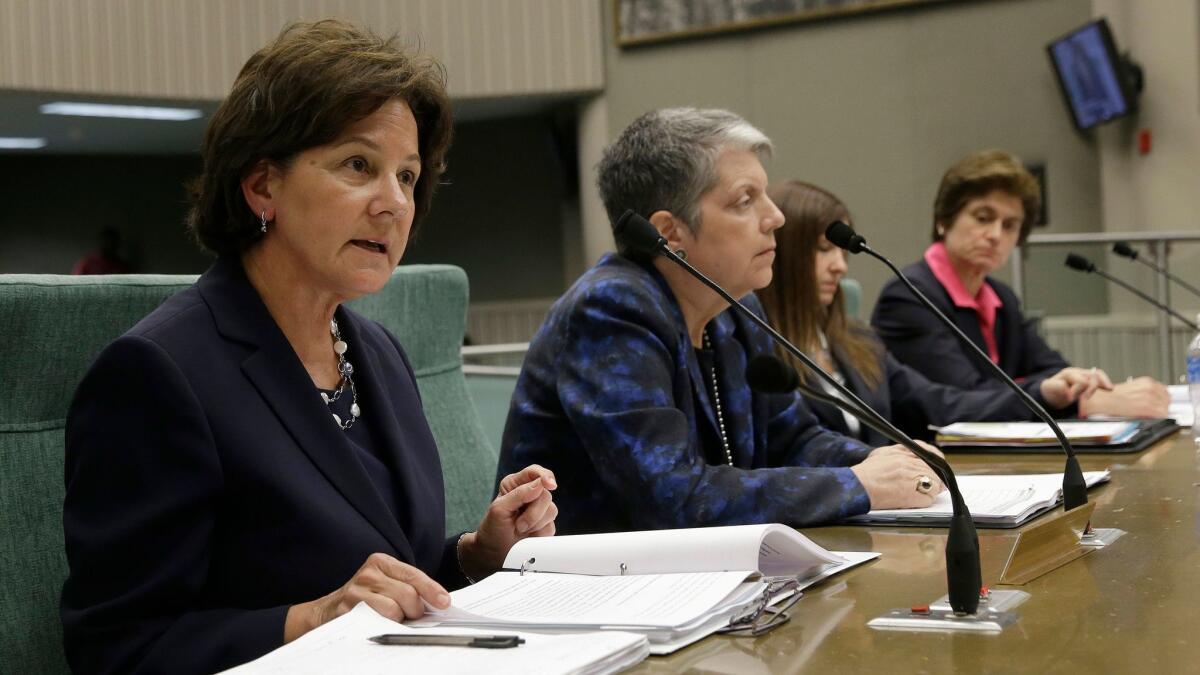UC regents to tackle hot-button issues of state audit and nonresident enrollment

- Share via
University of California regents will get their first chance this week to drill down into a critical state audit that found widespread problems with the budget practices of the UC Office of the President.
The regents, opening a two-day meeting Wednesday in San Francisco, also will vote on a proposal to limit the enrollment of out-of-state and international students for the first time in the 10-campus system’s history. Many California families and legislators have complained that UC’s rising number of nonresident undergraduates has squeezed out local students. State lawmakers are requiring the university to adopt a nonresident student enrollment policy in order to receive $18.5 million in additional money this year.
Under the proposal, nonresident students would be limited to 18% of undergraduate enrollment at UC Davis, UC Riverside, UC Santa Cruz, UC Santa Barbara and UC Merced. The four campuses at which out-of-state students already exceed 18% — UC Berkeley, UC San Diego, UCLA and UC Irvine — would be allowed to maintain but not increase the higher percentage they enroll in 2017-18. Campuses scrambled to admit larger numbers of nonresident students because they pay $27,000 more in annual tuition than Californians.
The meeting’s most dramatic moments will probably come Thursday, when State Auditor Elaine Howle will present her findings to the regents. The audit last month found that the president’s office had amassed a $175-million undisclosed budget reserve, paid generous salaries, failed to justify systemwide initiatives and inappropriately screened campus responses to auditor surveys.
The findings have sparked calls for the resignation of UC President Janet Napolitano, tighter state control of UC and a rollback of the 2.5% tuition hike approved by regents this year. Some critics also are demanding more forceful oversight by regents, saying they too often rubber-stamp recommendations by top administrators.
Napolitano has disputed the audit’s finding of a hidden reserve. She said the surplus funds amounted to $38 million, with the rest of the money budgeted for systemwide priorities such as aid to undocumented students and sexual misconduct victims.
She and Board of Regents Chairwoman Monica Lozano have accepted the audit’s 33 recommendations for improvement. But Gov. Jerry Brown last week announced that he would withhold $50 million in UC funding until the university adopts the reforms, as a way to “hold their feet to the fire.”
Regents voted unanimously last week to hire an outside independent investigator to look into the allegations that central administrators interfered with auditors’ confidential surveys to campuses. The surveys were intended to give auditors information on how campuses viewed services provided by the president’s office.
Bernie Jones, Napolitano’s deputy chief of staff, told The Times last month that he organized a conference call to campuses about the surveys only after some of them asked the president’s office for help in filling them out. He said he previewed responses to make sure they were accurate, within the audit’s scope and in line with the chancellor’s views. Jones said he suggested but did not order changes in three cases.
On the budget front, William G. Tierney, a USC education professor, said it was a mistake for UC to “squirrel away” funds even though they appear to have been legitimately used.
“In an environment where sunshine is critical, to have appeared to have hidden the money is a blunder,” he wrote in an email.
But he said he thought there was too much outcry over the audit’s critique of UC salaries and entertainment expenses. Spending on receptions and other events did not seem extravagant, he said, and the difference between UC salaries and those of comparative institutions was not large enough to cause the uproar it has.
“I’m troubled that the UC is a punching bag for fiscal extravagance when in the grand scheme of things this is not what the audit found,” said Tierney, co-director of the USC Pullias Center for Higher Education, which analyzes issues including university governance, finances and student access.
Tierney said he supported the proposed cap on nonresident students because UC’s reliance on them has not necessarily been good for the state. Without them, he said, more California students could be admitted to their campuses of choice — and if UC reduced enrollment, those admitted would enjoy smaller class sizes.
“Let’s acknowledge that the vast majority of out-of-state students are being used to help balance the budget,” he said. “It’s regrettable that the UC has to resort to that strategy, but they don’t have many options unless they want to seriously reform the way they do business and educate our students.”
On other matters, regents also will vote on a 2017-18 budget and discuss progress in increasing the number of transfer students to UC.
ALSO
UC revises its plan to limit the share of spots going to out-of-state students
No $50 million without reforms, Gov. Jerry Brown warns UC
More to Read
Sign up for Essential California
The most important California stories and recommendations in your inbox every morning.
You may occasionally receive promotional content from the Los Angeles Times.











